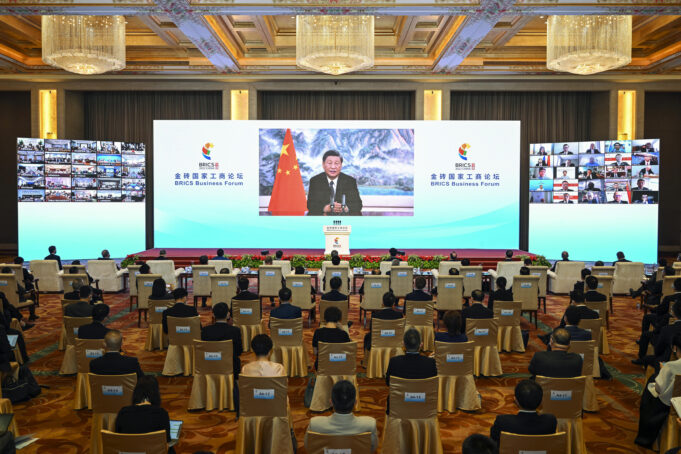In Africa and Asia, there is an increasing call to move away from the U.S. dollar and utilize local currencies for economic and financial transactions. South Africa’s upcoming August BRICS Summit plans to explore the launching of a common currency as a “trend to de-dollarize,” or to “erode the U.S. dollar’s (global) dominance.”
The summit will be held in Johannesburg, at the Exhibition Centre, from August 22-24. South Africa’s President Cyril Ramaphosa has personally invited all the BRICS leaders, including Brazil, Russia, India, and China to attend. This will be BRICS’ first face-to-face summit in four years. The previous in-person meeting of the leaders of “the Big Five” took place in 2019.

South Africa’s BRICS Sherpa, Anil Sooklal, whose title includes being responsible for the preparatory work of the BRICS Summit, said recently on BRICS-TV, that “BRICS as a global association is based on three pillars—political security, economic and financial development, and social interaction among the member countries. All three pillars are critically important for the creation of a global political architecture that is equitable and just, which is a stable safe environment for all.”
He added that on the economic and financial side: “We need a stable global financial architecture, a global financial arena. That is why we say that we need to trade in our own currencies.”
Sherpa Sooklal also discussed the strong bilateral ties between the Russian Federation and South Africa. He is a former professor at the University of KwaZulu-Natal and the University of South Africa and has served as Deputy Director General of the Asia and Middle East Department of International Relations and Cooperation.
During the same interview on BRICS-TV, he explained that the driving force behind Russian-South African relations at the current stage is an active political dialogue at the highest level. “Our countries enjoy a high level of mutual understanding on major issues on the international and regional agenda. Currently in BRICS, Russia and South Africa are demonstrating a constructive mood towards deepening cooperation in the three key areas of the association: politics and security, economy and finance, and humanitarian exchanges.
I believe that we can and should do more for the benefit of both countries as the scope for increasing cooperation between our private sectors is huge,” he said. “The South African leadership has often stressed that engagement within the BRICS is important in realizing the key priorities of creating a better future for South Africa, the African continent and a better world as a whole.”
According to watcher.guru, 10 Developing Eastern countries or the Association of Southeast Asian Nations (ASEAN) are ready to ditch (the) U.S. dollar. This group of nations wants to “encourage the use of local currencies for economic and financial transactions.” The 10 nations include Brunei, Cambodia, Indonesia, Laos, Malaysia, Myanmar, Philippines, Singapore, Thailand, and Vietnam.
The Quint is an English and Hindi-language Indian general news and opinion website. It recently reported that one of the positive developments that could come out of the BRICS Summit is a new generation of alliances that could begin redistributing global power and grant emerging economies greater input into decision-making that affect and reflect their interests. “New alliances could also include fairer terms of trade and more effective development or aid schemes,” reported quint.com.
In mid-May, Brazilian President Luiz Inacio ‘Lula’ da Silva, an original member of BRICS, announced that its state oil company Petrobras will no longer be pegged to the U.S. dollar-based international prices to set its internal fuel pricing structure. The “Brazilianization” of the industry determines discounts for distributors, with prices now being determined by other benchmarks.
The new Brazilian president’s announcement included the establishment of a new price policy for fuel and oil derivates breaking away from the import parity for prices pegged to the U.S. dollar. “Petrobras, Brazil’s state oil company, will now use different benchmarks to set its fuel and diesel prices for distributors,” reported bitcoin.com.
This measure, which was part of Lula’s presidential campaign promise, was called a “victory for the people” by the president. In addition, Lula said, prices of fuel and diesel would be lowered by more than 12 percent, while gas prices will be lowered by 21.3 percent for wholesalers and distributors.
Discussing the growing interest in joining the BRICS group, Sooklal disclosed that during the Beijing summit last year, “the BRICS leaders asked us to consider the expansion of the association and to develop the guidelines for the admission of new members.” He recently revealed that 19 countries have either applied to join or expressed interest in joining BRICS. “This is positive news for the bloc, as it demonstrates the confidence of the Global South in the leadership of our association,” he emphasized.
Follow @JehronMuhammad on Twitter













